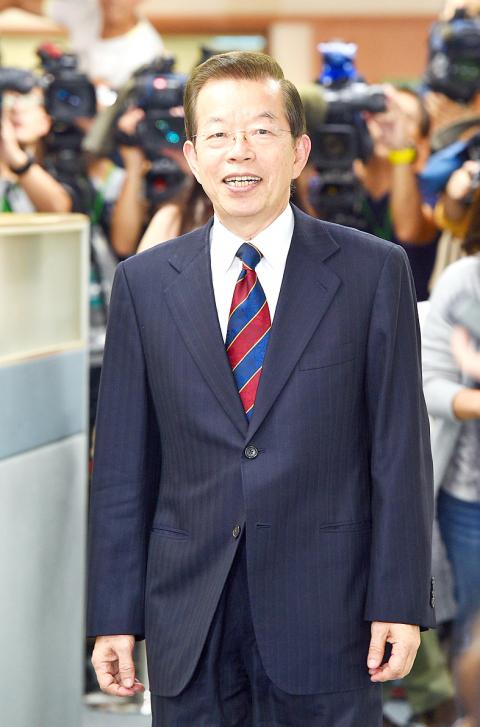Former premier Frank Hsieh (謝長廷) yesterday confirmed he would be appointed representative to Japan, adding that his mission would be to enhance cooperation between the two countries, but that he would not form any anti-China alliance with Japan.
Although it has long been an “open secret” among political circles and the media, Hsieh officially confirmed the appointment in an exclusive interview with the Nikkei Shimbun published yesterday.
In the interview with the Japanese newspaper, Hsieh said the appointment was significant for two reasons: First, it shows that president-elect Tsai Ing-wen (蔡英文) attaches great importance to the relationship between the two countries; and second, appointing a nonprofessional diplomat means that Tsai does not expect many problems between Taiwan and Japan.

Photo: Lo Pei-der, Taipei Times
He said in the interview that the incoming government hopes to make Taiwan a buffer zone between Japan and China, adding that the new government “would neither form an alliance with China against Japan nor form an alliance with Japan against China.”
Separately yesterday, Hsieh, in response to media queries, said that although there are disputes between Taiwan and Japan, the two nations should solve the problems without jeopardizing friendly relations.
“As to the dispute over sovereignty over the Diaoyutai Islands (釣魚台), I would say that the Diaoyutais belong to Taiwan, but the point is to solve the fishing issue for our fishermen, because they are disadvantaged and should not be sacrificed for political interests,” Hsieh said.
“That is why we eventually signed a fishing agreement with Japan,” he said.
Asked to comment on Japan’s recent seizure of Taiwanese fishermen near the Okinotori atoll in the Pacific Ocean, Hsieh said that both the executive and the legislative branches have handled it well.
“Premier Simon Chang (張善政) spoke about it, as did Legislative Speaker Su Jia-chyuan (蘇嘉全), while Japan soon released the fishermen,” Hsieh said.
“Now we should look at the fishing agreement we signed to see what we could improve to better take care of fishermen,” he said.

Alain Robert, known as the "French Spider-Man," praised Alex Honnold as exceptionally well-prepared after the US climber completed a free solo ascent of Taipei 101 yesterday. Robert said Honnold's ascent of the 508m-tall skyscraper in just more than one-and-a-half hours without using safety ropes or equipment was a remarkable achievement. "This is my life," he said in an interview conducted in French, adding that he liked the feeling of being "on the edge of danger." The 63-year-old Frenchman climbed Taipei 101 using ropes in December 2004, taking about four hours to reach the top. On a one-to-10 scale of difficulty, Robert said Taipei 101

Nipah virus infection is to be officially listed as a category 5 notifiable infectious disease in Taiwan in March, while clinical treatment guidelines are being formulated, the Centers for Disease Control (CDC) said yesterday. With Nipah infections being reported in other countries and considering its relatively high fatality rate, the centers on Jan. 16 announced that it would be listed as a notifiable infectious disease to bolster the nation’s systematic early warning system and increase public awareness, the CDC said. Bangladesh reported four fatal cases last year in separate districts, with three linked to raw date palm sap consumption, CDC Epidemic Intelligence

Taiwanese and US defense groups are collaborating to introduce deployable, semi-autonomous manufacturing systems for drones and components in a boost to the nation’s supply chain resilience. Taiwan’s G-Tech Optroelectronics Corp subsidiary GTOC and the US’ Aerkomm Inc on Friday announced an agreement with fellow US-based Firestorm Lab to adopt the latter’s xCell, a technology featuring 3D printers fitted in 6.1m container units. The systems enable aerial platforms and parts to be produced in high volumes from dispersed nodes capable of rapid redeployment, to minimize the risk of enemy strikes and to meet field requirements, they said. Firestorm chief technology officer Ian Muceus said

MORE FALL: An investigation into one of Xi’s key cronies, part of a broader ‘anti-corruption’ drive, indicates that he might have a deep distrust in the military, an expert said China’s latest military purge underscores systemic risks in its shift from collective leadership to sole rule under Chinese President Xi Jinping (習近平), and could disrupt its chain of command and military capabilities, a national security official said yesterday. If decisionmaking within the Chinese Communist Party has become “irrational” under one-man rule, the Taiwan Strait and the regional situation must be approached with extreme caution, given unforeseen risks, they added. The anonymous official made the remarks as China’s Central Military Commission Vice Chairman Zhang Youxia (張又俠) and Joint Staff Department Chief of Staff Liu Zhenli (劉振立) were reportedly being investigated for suspected “serious